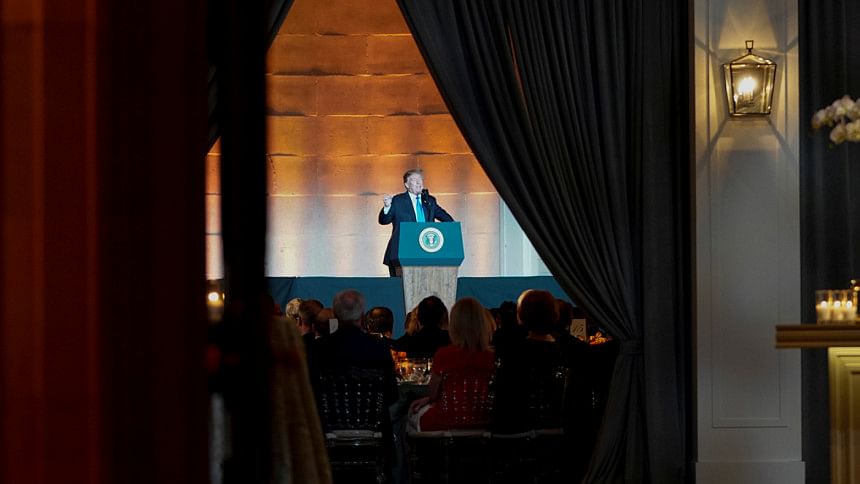'Very dangerous'

US President Donald Trump voiced alarm at the "very dangerous situation" between India and Pakistan, warning that New Delhi was considering "very strong" action after an attack in Kashmir.
"It's very dangerous situation between the two countries. We would like to see it stop," Trump said, adding that the United States was seeking talks with Pakistan.
"Right now there is a lot of problems between India and Pakistan because of what happened," he told reporters as he met a senior Chinese official in the Oval Office.
Tensions have soared between the nuclear-armed rivals since a suicide attack last week killed 40 soldiers on the Indian side of divided Kashmir, the deadliest attack in years.
"India is looking at something very strong. India just lost almost 50 people with an attack. So I can understand that also," Trump said.
The region has been on edge since the February 14 attack claimed by Pakistan-based Islamist group Jaish-e-Mohammed (JeM).
India has accused Pakistan of supporting the attack -- a claim rejected by the Islamabad government -- and there have been widespread calls for Indian Prime Minister Narendra Modi to order a reprisal strike.
Meanwhile, Indian authorities arrested dozens of Muslim leaders in raids across Kashmir and sent thousands of reinforcements to the troubled territory yesterday.
As international concern grows over India-Pakistan sabre-rattling, residents of Kashmir, at the centre of a decades-old struggle between the nuclear-armed neighbours, reported heightened military activity.
About 10,000 paramilitaries started arriving in Kashmir yesterday, a day after India ordered the reinforcements.
Modi told a rally in Rajasthan state that the country was "angry" about the attack in the Pulwama district of Indian-held Kashmir.
"After the Pulwama attack, you must have seen how Pakistan is being brought to account one step at a time. They are in a state of panic because of our government's decisions," Modi said, speaking in Hindi.
"We will not sit quietly after taking this pain. We know how to crush terrorism," he added. "We have given full freedom to the military."
Among those taken into custody in the crackdown in Kashmir were senior figures in Jamaat-e-Islami, the region's biggest religious organisation, and the Hurriyat Conference, a coalition of local political parties.
Jamaat and Hurriyat Conference both strongly support Muslim Kashmir's right to choose whether it wants to be part of India or Pakistan, which have been fighting over the region since independence in 1947.
"Police and other agencies launched a mass arrest drive and raided many houses in the valley with dozens of... central and district-level leaders arrested," Jamaat said in a statement, adding that those detained included central leader Abdul Hamid Fayaz.
Police linked the arrests to security preparations for upcoming elections in India and a Supreme Court hearing on Monday on a challenge to a constitutional provision that gives Kashmiris special rights to property and jobs in the territory.
But the arrests drew widespread criticism from Kashmir political leaders.
"Fail to understand such an arbitrary move which will only precipitate matters," Mehbooba Mufti, a pro-India former chief minister said on Twitter. "You can imprison a person but not his ideas."
"Such illegal and coercive measures against Kashmiris are futile and will not change realities on ground," wrote Mirwaiz Umar Farooq, an influential separatist leader, on Twitter.
Businesses across Kashmir were shut yesterday, some in protest at the arrests and with others fearing conflict between India and Pakistan.
Many in Kashmir are wary of a military strike over the suicide bomb and residents in several areas reported unusual military air activity on Friday night. Authorities did not comment on the reported fighter aircraft and helicopters flying over the territory.
Pakistan's Prime Minister Imran Khan has vowed retaliation if his country is attacked. In a letter to the UN Security Council released yesterday, Pakistani Foreign Minister Shah Mehmood Qureshi accused India of "warmongering".
Pakistan's military on Friday warned India against any "misadventure," saying it was capable of responding.
India and Pakistan have fought two of their three full-fledged wars over Kashmir since their partition at independence from Britain in 1947.

 For all latest news, follow The Daily Star's Google News channel.
For all latest news, follow The Daily Star's Google News channel. 



Comments